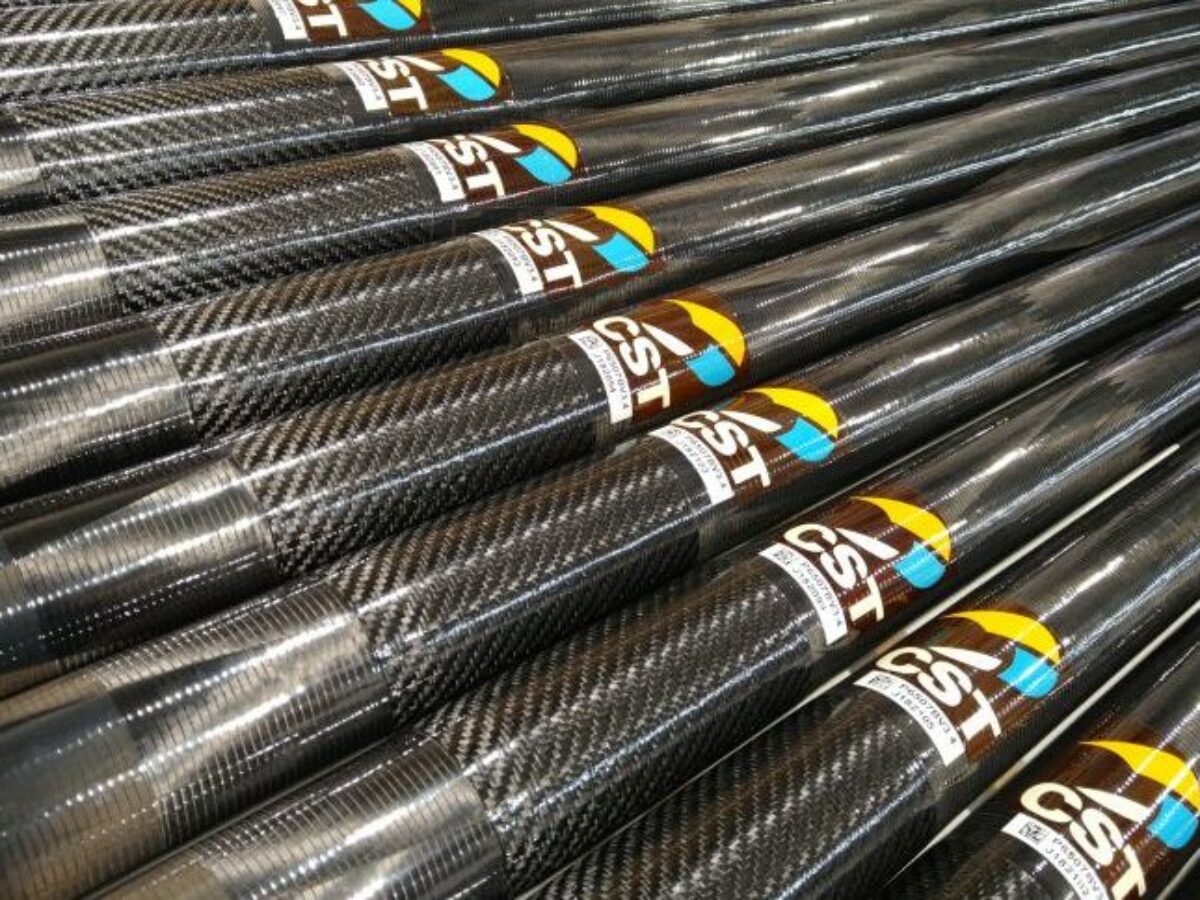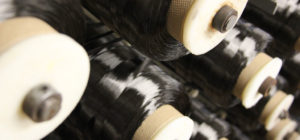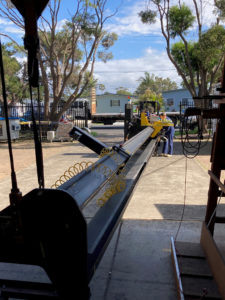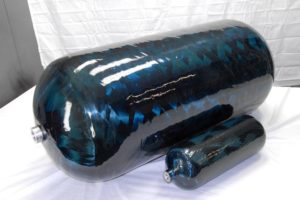Celebrating Australian Made: A quiet achiever’s homespun wisdom

Today our Celebrating Australian Made editorial series takes a look at CST Composites, which exports 90 per cent of what it makes. Brent Balinski speaks to Managing Director Clive Watts, who started the company by building production machinery in his garage in the 1990s.
If people have heard of CST Composites at all, it’s likely for their work in the marine industry.
The company doesn’t do much in the way of media, but has been highly involved in elite-level sailing from early on. It has contributed to many world-beating Australian efforts, including Matt Wearn’s gold in the one-person dinghy at last year’s Tokyo Olympics (CST supplied the top mast sections in the Laser and Laser Radial classes at Tokyo.)
Clive Watts began CST in 1996 and for the first five years worked in the backyard of a run-down house in Woolooware. He began his degree not many years after Australia’s America’s Cup win, then focussed on filament winding and saved up while working at Hawker de Havilland.
“I’m not an engineer per se; I’m a material scientist. I was pretty handy, so I could kind of weld and machine and do things, but didn’t have many tools,” he tells @AuManufacturing.
“With the help of a few people… I built my first winding machine in my garage.”
The era saw boats go from aluminium to composite masts to save weight and bring times down. Watts would figure out the bend of masts and reverse engineer something better out of carbon fibres.

Fibre spools
(Picture: CST Composites)
While the company’s masts were winning world titles, its composite tubes (CST stands for composite spars and tubes) were in demand in other places where they could save weight while providing stiffness and strength, including race cars, space frames and helicopter magnetometer systems for mineral detection (still a relevant market.)
“People use tubes for all weird and wonderful things. We even had people buying tubes for jousting sticks, believe it or not,” says Watts.
Today CST is an archetypal high-performing Aussie SME manufacturer. Its highly-skilled team exports nearly everything it makes, and makes little fuss in the process. On-the-record work for customers including NASA, Ford and Cirque du Soleil. What’s possibly more impressive is the off-the-record work that has grown the company in the last few years, including over 40 million parts and counting to one famous home appliance company, and 100,000 to another high-profile consumer goods maker.
CST’s story is one of international success combined with qualities you might associate with Australian-ness – shyness, plain-spokenness, and resourcefulness. Quietly going about its business and dealing with everything that comes with geography.
“At one stage there in the late 2000s we bought a machine. But being in Australia, which is far from all the markets and support for these winding machines, it’s very difficult,” shares Watts.
“The process to buy something… takes pretty close to 18 months at least to get it. And if the thing breaks it costs a horrendous amount of money to get it fixed.”
Speed wins you customers
The machines CST has developed are now at version nine. Its bespoke ERP software is also something it hopes to sell into the United States (where it recently formed a joint venture with Optimum Composite Technologies.)

One of the company’s winding machines (picture: www.cstcomposites.com/author/cst/)
Like so much of what the company has developed, these were driven by necessity.
A turning point was when it began to hire full-time IT staff, according to Watts, who says the company was involved in Industry 4.0 approaches before he’d heard of the term. He estimates its database has grown to 850 million rows of data, with 12,000 revisions of its ERP system made so far.
“A lot of it’s been written around making tubes and how tubes bend and the weights involved with that and what it’s going to cost and how much margin we’re making on that, and quality and stuff associated,” he adds.
“That’s been a really key moment in our business, that ability to track all that data, to give us that level of scalability.”
As part of its quest for greater self-reliance, CST has also invested millions to bring toolmaking in-house. This followed the use of a Californian tooling company that was “pretty good” but had higher-priority clients it was focussed on.
“We learned centreless grinding alone by ourselves. And so we’re making our own tooling, and we also got into CNC machining,” explains Watts.
Reject rates have improved for parts, and lead times have shrunk from about eight weeks to the point where Watts runs a “5 am mandrel challenge.”
He gets up at 5 am, designs something – perhaps a mast for a sailing boat – and passes it to the team at 6 or 7 am or so. A mandrel is created by 2 pm in the afternoon, including in-house hard-anodising.
“You get to a point where the tooling is becoming so cheap that you can win orders because you can just sort of give the tooling away for free,” he adds, citing a sample provided to the home appliance company in six days.
“And it’s the speed to market is what wins you customers, ultimately.”
Salt Lake City-bound
Figuring things out on their own has been an asset, believes the founder.
“I think the good thing about Australians and what we do is you don’t necessarily look at how other people do things,” says Watts.
“You pretty well go, ‘Well, I’ve got this problem to solve.’ You want your broad set of skills that you’ve got to solve those problems and you just… innovate.
“You find that you do stuff that other people just haven’t done before. And that’s kind of the history of CST.”
It’s worked for the company, which is the biggest consumer of carbon tow products in ANZ, and which grew out of its backyard origins and into a site at Kurnell in 2001, adding a second site for volume production at Ingleburn in 2015, and establishing a presence in the US this year.
Not bad going for a company that started with $30,000, according to Watts, has taken on no debt or investors, and expanded purely by reinvesting its profits.
Watts gives few interviews and besides a few names on the company’s website, chooses not to publicise much about what are some pretty big name clients. It’s a position that certain high-performing SMEs can find themselves in – deserving of recognition but unlikely to get too much of it due to their clients’ preferences. It’s easy to sympathise with said SMEs: they are just doing the right thing by their client. The publicity can also put a target on their back for cyber-criminals.
Call it the curse of the contract manufacturer: they do their job, sign their NDAs, and their light remains under the proverbial bushel.
“Our clients are such that it’s normally cutting edge, so they don’t really want to let their supply chain out themselves, and they don’t want to let any of their IP go,” says Watts.
“But when contracts end, we can sometimes do it.”

Pressure vessels (Image credit: Optimum Composite Technologies)
When we spoke to Watts a few weeks ago, the cagey company was preparing to head over to Utah to meet its JV partner, and to bring its homegrown machinery and software to be set up in a new home.
Watts sees the new business as an opportunity to do well in the global supply chain for green hydrogen, combining its expertise with that of a company designing and making composite pressure vessels.
There’s another kind of victory in there, too, in taking what they’ve developed to Salt Lake City, home of NASA’s Kennedy Space Center and a rich heritage in composites for aerospace. It’s like exporting fridges to Antarctica, suggests Watts.
“Even though we own part of that business, the story is that the birthplace of filament winding was really Salt Lake City around the rocket industry,” he explains.
“We’re going to be selling Australian technology, including our software, into the American companies. So it’s a bit of a story, a little bit like the America’s Cup – we’re showing the Americans how.”
Main picture: CST Composites/Linkedin
![]() @AuManufacturing’s editorial series – Celebrating Australian Made – is brought to you with the support of the Australian Made Campaign Ltd, licensor of the Australian Made logo. For more information about using the logo, visit this link.
@AuManufacturing’s editorial series – Celebrating Australian Made – is brought to you with the support of the Australian Made Campaign Ltd, licensor of the Australian Made logo. For more information about using the logo, visit this link.
Subscribe to our free @AuManufacturing newsletter here.
Topics Analysis and Commentary
@aumanufacturing Sections
Analysis and Commentary Awards Defence Manufacturing News Podcast Technology Videos






